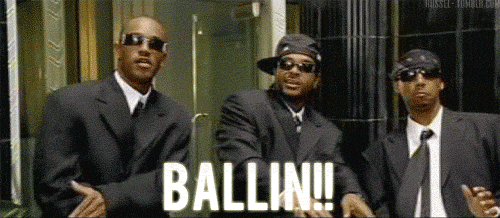Henry Orbit
Finesser
And the Lord said, you've got to rise up...to heaven. #RIP Stu


You disrespectfulI'm already balling at Stuart Scott's passing


#blackexcellence exemplified.. He MADE them love him! I been rocking with him from the beginning of his career.. Always was professional, and was able to bring what he loved and his style they some may have considered too "black" to millions.. The haters had nothing to do but respect him, if we keeping it 100 he had more than a few...
Fukk cancer fukk cancer.. December 2005 we found out my momz was a little sick and would need a little rehab , momz being as resilient as she was, knowing she would beat didn't even tell me it was cancer for a few months.. Chemo went well for first 6 months as we coped with the effects and momz still was as positive as ever... Then the shyt started to spread to other places of her body... Fast forward to roughly September 2006, do you know the pain of the doctor telling me and my brother she will never walk again, and momz still on her G shyt saying watch me walk outta here... Oh you just gonna cry the whole time, she would joke as me as I visited the room.. Fast forward to may 2007 and bytch ass cancer got my mom Duke at 49 years old.. 49, when most people aren't even getting colon cancer checks til 50.. Get physicals, but overall live life brehs
So here's what Stuart Scott's teammates could see that viewers couldn't. They couldn't see him suffer through a chemotherapy session at, say, 10 a.m., catch a quick nap and maybe a small bite, put himself through a kickboxing class or some other rigorous physical routine in an attempt to strengthen his body for its fight with cancer, show up at the studio to prepare for a Friday night NBA doubleheader that might require us to work until 1 a.m., and plow right through the evening without so much as a bad word for or to anybody.
That scenario, or something like it, played out way too often during the last seven years of Stuart's 49. He'd close his eyes during the commercial breaks at times. There were trips to the bathroom that we knew included violent illness. There's not a person in the Bristol studios who didn't say at some point, "Stuart, seriously, you shouldn't work tonight," and his response pretty damn frequently was: "Bro, I'm good."
And he was ... to the last drop.
We were from the same place, the South Side of Chicago, but approached what we did in radically different ways, which is why I didn't know exactly what to make of Stuart when I first saw him on-camera in the early 1990s. I was as intimately familiar with Pookie and Ray Ray as he was, but didn't think they belonged in a delivery of the day's sports news.
I was brought up in a buttoned-up world of traditional journalism where the person reporting/commenting/analyzing didn't call attention to himself. Stuart, very deliberately and without much fear, was in the process of taking us to a new world of sports coverage, one where you let your emotion come pouring out much of the time, where personality would infuse the coverage. It wasn't just that a Scott-delivered story sounded "blacker" -- and it did, it sounded younger, and hipper, had greater edge and connected with an entire population of viewers who had been ignored. Not every reference to music needed to be the Beatles or Rolling Stones, not for those of us who preferred Earth, Wind & Fire or Chuck D. More than anybody working then or now, Stuart Scott changed the very language used to discuss sports every day. He updated it, freshened it, made it more inclusive. And he took hell for it.
How nerdy is it, looking back, to have felt that Stuart was some kind of pioneer for simply wanting to be himself on television? But he was exactly that, and because that evolution took the better part of 20 years, there is now an entire generation of young media folks, black and white, male and female, who don't feel the need to conform, and that is an enormous and admirable part of his professional legacy.




 Taking that football to the eye? Real talk that's like the 2pac of sideline reporting.
Taking that football to the eye? Real talk that's like the 2pac of sideline reporting. 

 as a youngin. I know a lot of white people claim they learned what various urban phrases meant by listening to rap but let's be real: they learned that shyt watching Sports Center with Stu.
as a youngin. I know a lot of white people claim they learned what various urban phrases meant by listening to rap but let's be real: they learned that shyt watching Sports Center with Stu. 
